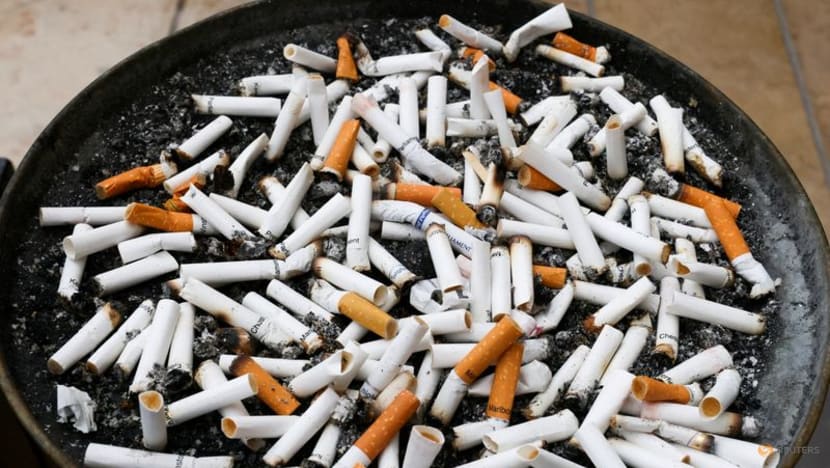New Zealand to scrap generational smoking ban to help pay for promised tax cuts: Reports


This audio is generated by an AI tool.
New Zealand will scrap its generational ban on smoking to help pay for promised tax cuts, following an agreement by the country’s new three-party coalition government.
The ban, which was touted as a world-first, had promised to bar future generations of New Zealanders – anyone born after 2008 – from ever purchasing tobacco, as well as drastically cut the number of retailers able to sell such products.
New Zealand's National Party sealed the agreement on Friday (Nov 24), after drawn-out negotiations over ministerial roles and policies including Indigenous rights, tax cuts and changes at the central bank.
The centre-right Nationals, led by Prime Minister Christopher Luxon, returned to power alongside the populist New Zealand First party and libertarian ACT New Zealand after six years of rule by governments led by the left-leaning Labour Party.
The new government will cut personal income taxes, following through on a campaign policy used to woo middle-income voters struggling with rising costs of living.
The coalition agreement also outlines other plans, including the repeal of a ban on the sale of cigarettes to future generations introduced by the previous Labour government.
Documents show the new government will repeal the Smokefree Environments and Regulated Products (Smoked Tobacco) Amendment Act 2022 to “remove the requirements for denicotinisation and the reduction in retail outlets”.
The National Party and New Zealand First have also agreed to do away with the laws before March 2024.
ELECTION PROMISES
Incoming Finance Minister Nicola Willis told Newshub Nation on Friday that the Treasury assessed the effect of the generational ban and concluded that the “range of restrictions would significantly reduce revenue to the Crown”.
Reprioritisation was needed to ensure additional revenue to deliver on major election promises including tax cuts, she said.
ACT New Zealand leader David Seymour told Newshub Nation in a separate interview that ditching the ban would ensure an inflow of funds.
“The government can continue to tax it … we have to remember that the changes to the smoke-free legislation had a significant impact on the government books,” he said.
According to the New Zealand arm of British American Tobacco (BAT), tobacco products make their largest financial contribution to the country’s economy. This comes in the form of excise taxation, with the industry paying over NZ$2 billion (US$1.2 billion) in total taxes a year.
After he was sworn in on Monday, Luxon cited fears of a flourishing black market as the reason behind the scrapping.
He conceded the tax revenue from ongoing cigarette sales would also generate welcome revenue for the government, but stressed it was "not the motivation for doing it".
Anti-smoking group Health Coalition Aotearoa - the Maori name for New Zealand - said the policy backdown was an insult to the country.
"This is a major loss for public health, and a huge win for the tobacco industry, whose profits will be boosted at the expense of Kiwi lives," the group said in a statement.
Luxon said the cigarette ban would create "an opportunity for a black market to emerge, which would be largely untaxed".
The legislation, scheduled to start later this year, was designed to almost immediately reduce the number of people using tobacco products.
While the number of adults smoking in New Zealand is already relatively low at just 8 per cent, the previous government had envisioned a future where the country was completely smoke-free.
As well as the steadily increasing age limit, the new law would have slashed the number of retailers able to sell tobacco products to a maximum of just 600 nationwide, a massive drop from the current figure of 6,000.
Unveiled under former prime minister Jacinda Ardern, the so-called "generational smoking ban" had been praised by public health experts and anti-smoking advocates. And recently, a suite of near-identical measures were announced in the United Kingdom.
Commenting on New Zealand's U-turn, a spokesperson for UK Prime Minister Rishi Sunak said that the British government's plans to similarly tighten smoking laws in the country remain unchanged.
"We are committed to that," the spokesperson was quoted as saying by SkyNews.
Singapore, which has been actively clamping down on smoking, said in January last year that it was open to the idea of a cohort ban.
"It is an attractive proposal, in that it prevents young people from taking up smoking while not putting too many restrictions on older smokers. Then, of course, as the years go by, more and more cohorts are smoking free,” said Senior Minister of State for Health Koh Poh Koon in parliament.
He was responding to Members of Parliament who asked smoking-related questions, including whether Singapore will study and introduce such a ban, following the New Zealand government’s plans to do so.
While the Ministry of Health is open to studying such a policy, he noted that the government needs to take into account a few considerations, including the fact that young people in Singapore are generally not taking up smoking, unlike the youths in many other countries.















